- Clone
- 2F1/KLRG1 (See other available formats)
- Regulatory Status
- RUO
- Other Names
- MAFA, 2F1-Ag
- Isotype
- Syrian Hamster IgG
- Ave. Rating
- Submit a Review
- Product Citations
- publications
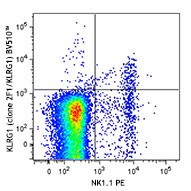
-

C57BL/6 mouse splenocytes were stained with NK1.1 PE and KLRG1 (clone 2F1/KLRG1) Brilliant Violet 510™.
| Cat # | Size | Price | Quantity Check Availability | Save | ||
|---|---|---|---|---|---|---|
| 138421 | 50 µg | 248€ | ||||
This product is eligible for a 40% discount! Purchase two or more BV510, BV570, BV605, or BV650 products in any combination to qualify. Exclusions apply. Visit our webpage to view full promotion details or to contact your local BioLegend representative for a quote.
Killer cell lectin-like receptor G1 (KLRG1) is the mouse homolog of the rat mast cell function-associated antigen (MAFA or 2F1-Ag). KLRG1 is a type II membrane glycoprotein that was first identified on the surface of rat mast cell line RBL-2H3. It is composed of a homodimer of glycosylated 30-38 kD subunits. Mouse and human homologs of KLRG1 are expressed by subsets of NK cells and lymphokine-activated killer (LAK) cells but not mast cells. KLRG1 is also expressed on subsets of CD8+ and CD4+ cells, including CD4+ and CD8+ effector/memory cells, potent regulatory CD4+ T cells. KLRG1 may be involved in regulating NK cell homeostasis. KLRG1 was found to recognize cadherins and thus inhibit immune responses by regulating the effector function and the developmental processes of NK and T cells.
Product DetailsProduct Details
- Verified Reactivity
- Mouse, Human
- Antibody Type
- Monoclonal
- Host Species
- Syrian Hamster
- Immunogen
- IL-2 activated NK cells from C57BL/6 mice
- Formulation
- Phosphate-buffered solution, pH 7.2, containing 0.09% sodium azide and BSA (origin USA).
- Preparation
- The antibody was purified by affinity chromatography and conjugated with Brilliant Violet 510™ under optimal conditions.
- Concentration
- 0.2 mg/ml
- Storage & Handling
- The antibody solution should be stored undiluted between 2°C and 8°C, and protected from prolonged exposure to light. Do not freeze.
- Application
-
FC - Quality tested
- Recommended Usage
-
Each lot of this antibody is quality control tested by immunofluorescent staining with flow cytometric analysis. For flow cytometric staining, the suggested use of this reagent is ≤0.25 µg per million cells in 100 µl volume. It is recommended that the reagent be titrated for optimal performance for each application.
Brilliant Violet 510™ excites at 405 nm and emits at 510 nm. The bandpass filter 510/50 nm is recommended for detection, although filter optimization may be required depending on other fluorophores used. Be sure to verify that your cytometer configuration and software setup are appropriate for detecting this channel. Refer to your instrument manual or manufacturer for support. Brilliant Violet 510™ is a trademark of Sirigen Group Ltd.
Learn more about Brilliant Violet™.
This product is subject to proprietary rights of Sirigen Inc. and is made and sold under license from Sirigen Inc. The purchase of this product conveys to the buyer a non-transferable right to use the purchased product for research purposes only. This product may not be resold or incorporated in any manner into another product for resale. Any use for therapeutics or diagnostics is strictly prohibited. This product is covered by U.S. Patent(s), pending patent applications and foreign equivalents. - Excitation Laser
-
Violet Laser (405 nm)
- Application Notes
-
For successful staining of human cells, brighter fluorophore-antibody conjugates, such as PE, BV421™, or APC, are recommended.
Additional reported applications (for relevant formats) include: Western Blotting1. - Application References
-
- Robbins SH, et al. 2002. J. Immunol. 168:2585. (WB)
- Robbins SH, et al. 2003. J. Immunol. 170:5876. (FC)
- McMahon CW, et al. 2002. J. Immunol. 169:1444. (FC)
- Product Citations
-
- RRID
-
AB_2563800 (BioLegend Cat. No. 138421)
- Disclaimer
-
This product may be used for research purposes only. It is not licensed for resale and may only be used by the buyer. This product may not be used and is not licensed for clinical assays, where the results of such assays are provided as a diagnostic service. If a diagnostic or therapeutic use is anticipated, then a license must be requested from the University of California. The availability of such diagnostic and therapeutic use license(s) cannot be guaranteed from the University of California.
Antigen Details
- Structure
- KLRG1 is an inhibitory lectin-like type II transmembrane receptor containing a cytoplasmic motif similar to ITIM, expressed mainly as a homodimeric molecule consisting of two N-glycosylated subunits of approximately 30-38 kD.
- Distribution
-
Subsets of NK cells, lymphokine-activated killer (LAK) cells and subsets of CD8+ and CD4+ cells.
- Function
- Regulates NK cell proliferation, maturation, and homeostasis. Inhibits immune responses by regulating the effector function and the developmental processes of NK and T cells.
- Ligand/Receptor
- E-cadherin
- Cell Type
- NK cells, T cells, Tregs
- Biology Area
- Immunology, Innate Immunity
- Antigen References
-
1. Grundemann C, et al. 2006. J. Immunol. 176:1311.
2. Blaser C, et al. 1998. J. Immunol. 161:6451.
3. Huntington ND, et al. 2007. J. Immunol. 178:4764.
4. Voehringer D, et al. 2001. J. Immunol. 167:4834. - Gene ID
- 50928 View all products for this Gene ID
- UniProt
- View information about KLRG1 on UniProt.org
Related Pages & Pathways
Pages
Related FAQs
Other Formats
View All KLRG1 Reagents Request Custom ConjugationCustomers Also Purchased
Compare Data Across All Formats
This data display is provided for general comparisons between formats.
Your actual data may vary due to variations in samples, target cells, instruments and their settings, staining conditions, and other factors.
If you need assistance with selecting the best format contact our expert technical support team.
-
Biotin anti-mouse/human KLRG1 (MAFA)
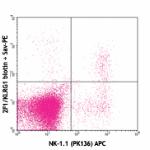
C57BL/6 mouse splenocytes stained with NK-1.1 (PK136) APC an... 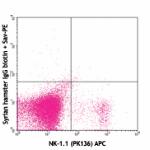
C57BL/6 mouse splenocytes stained with NK-1.1 (PK136) APC an... -
PE anti-mouse/human KLRG1 (MAFA)
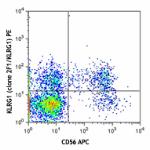
Human peripheral blood lymphocytes were stained with CD56 AP... 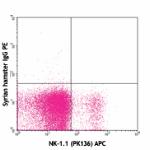
C57BL/6 mouse splenocytes stained with NK-1.1 (PK136) APC an... 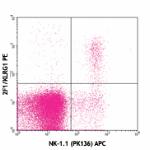
C57BL/6 mouse splenocytes stained with NK-1.1 (PK136) APC an... -
APC anti-mouse/human KLRG1 (MAFA)
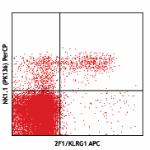
C57BL/6 mouse splenocytes stained with 2F1/KLRG1 APC and NK1... 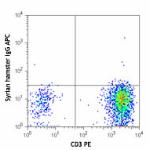
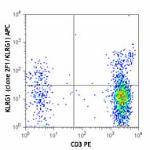
Human peripheral blood lymphocytes were stained with CD3 PE ... -
FITC anti-mouse/human KLRG1 (MAFA)
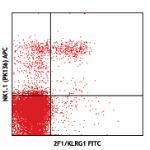
C57BL/6 mouse splenocytes stained with 2F1/KLRG1 FITC and NK... -
Brilliant Violet 421™ anti-mouse/human KLRG1 (MAFA)
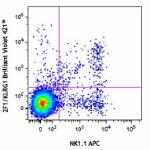
C57BL/6 mouse splenocytes were stained with KLRG1 (clone 2F1... -
PE/Cyanine7 anti-mouse/human KLRG1 (MAFA)
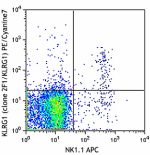
C57BL/6 mouse splenocytes was stained with NK1.1 APC and KLR... -
PerCP/Cyanine5.5 anti-mouse/human KLRG1 (MAFA)

C57BL/6 mouse splenocytes were stained with NK-1.1 APC and a... -
Brilliant Violet 605™ anti-mouse/human KLRG1 (MAFA)
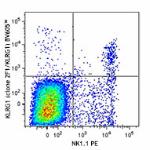
C57BL/6 mouse splenocytes were stained with NK1.1 PE and KLR... -
Brilliant Violet 510™ anti-mouse/human KLRG1 (MAFA)
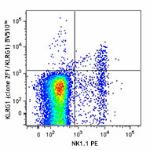
C57BL/6 mouse splenocytes were stained with NK1.1 PE and KLR... -
PE/Dazzle™ 594 anti-mouse/human KLRG1 (MAFA)
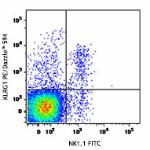
C57BL/6 mouse splenocytes were stained with NK1.1 FITC and K... -
APC/Cyanine7 anti-mouse/human KLRG1 (MAFA)

C57BL/6 splenocytes were stained with NK1.1 APC and KLRG1 (c... -
Brilliant Violet 711™ anti-mouse/human KLRG1 (MAFA)
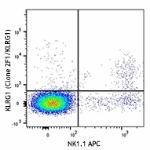
C57BL/6 mouse splenocytes were stained with NK1.1 APC and KL... -
Brilliant Violet 785™ anti-mouse/human KLRG1 (MAFA)
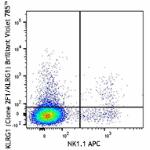
C57BL/6 mouse splenocytes were stained with NK1.1 APC and KL... -
TotalSeq™-A0250 anti-mouse/human KLRG1 (MAFA)
-
TotalSeq™-C0250 anti-mouse/human KLRG1 (MAFA)
-
TotalSeq™-B0250 anti-mouse/human KLRG1 (MAFA)
-
PE/Fire™ 810 anti-mouse/human KLRG1

C57BL/6 splenocytes were stained with anti-mouse NK1.1 FITC ... -
PE/Fire™ 640 anti-mouse/human KLRG1 (MAFA)

C57BL/6 splenocytes were stained with anti-mouse NK1.1 FITC ... -
APC/Fire™ 750 anti-mouse/human KLRG1 (MAFA)

C57BL/6 mouse splenocytes were stained with anti-mouse NK-1.... -
PE/Fire™ 700 anti-mouse/human KLRG1 (MAFA)

C57BL/6 mouse splenocytes were stained with anti-mouse NK-1.... -
Spark Red™ 718 anti-mouse/human KLRG1 (MAFA) (Flexi-Fluor™)
-
Spark Blue™ 574 anti-mouse/human KLRG1 (MAFA) (Flexi-Fluor™)
-
Spark Blue™ 550 anti-mouse/human KLRG1 (MAFA) (Flexi-Fluor™)

 Login / Register
Login / Register 










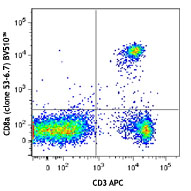
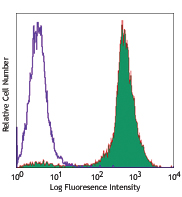
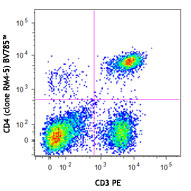
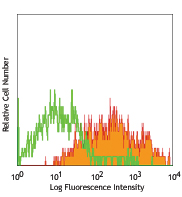



Follow Us